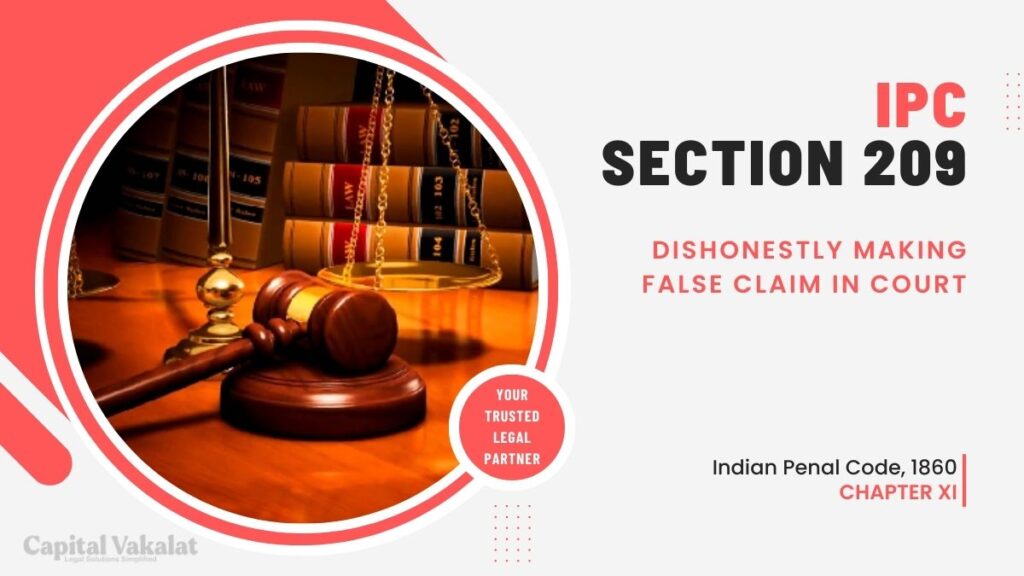In the realm of the Indian Penal Code (IPC), Section 209 stands as a stern guardian of justice, designed to safeguard the integrity of the legal process.

This article delves into Section 209 of the IPC, shedding light on what it entails, its implications, and the consequences of dishonestly making false claims in court.
Understanding Section 209 IPC
Section 209 of the IPC pertains to the act of dishonestly making false claims in court. It is a critical provision aimed at preserving the sanctity of legal proceedings in India. False claims can hamper the administration of justice, and this section serves as a deterrent against such malpractices.
Elements of Section 209 IPC
To be charged under Section 209 IPC, certain essential elements must be established. These include the intention to deceive the court, the act of making a false claim, and a clear connection to the court proceedings.
False Claim in Court: A Deeper Dive
Making a false claim can take various forms, such as presenting forged documents, providing misleading testimony, or concocting evidence to support a fabricated case. Section 209 addresses this wide spectrum of fraudulent activities.
Offenses and Punishments
Violating Section 209 IPC can lead to severe consequences, including imprisonment and fines. The severity of the punishment depends on the nature and impact of the false claim.
The Importance of Truth in Legal Proceedings
Honesty is the cornerstone of any legal system. Section 209 emphasizes the vital role of truth in legal proceedings, ensuring that justice is not subverted by dishonest practices.
Case Studies: Real-life Scenarios
To understand the real-world implications of Section 209, we explore case studies where individuals have been prosecuted for making false claims in court.
Legal Defenses
In certain situations, individuals may have legitimate reasons for their actions. We examine the legal defenses that can be employed to counter charges under Section 209 IPC.
The Role of Perjury
Perjury, the act of intentionally providing false information while under oath, is closely related to Section 209. We delve into the significance of perjury within the legal context.
Reporting False Claims
Victims of false claims have recourse. Reporting such claims is vital in upholding the principles of justice and integrity.
The Impact on the Justice System
Section 209 has a profound impact on the overall justice system, as it helps maintain the credibility and trustworthiness of the courts.
Challenges and Controversies
We explore the challenges and controversies surrounding Section 209 IPC, including issues related to enforcement and interpretation.
Recent Developments
The legal landscape is dynamic, and changes may occur over time. This section highlights any recent developments or amendments related to Section 209.
Prevention and Awareness
Preventing false claims in court is crucial. We discuss measures that can be taken to raise awareness and prevent such dishonest practices.
Conclusion
In conclusion, Section 209 IPC serves as a guardian of truth and justice in the Indian legal system. Upholding its provisions is vital to maintain the integrity of legal proceedings.
In a world where truth and justice are paramount, Section 209 IPC stands as a guardian, ensuring that the scales of justice remain balanced, and dishonesty is met with consequences. This provision serves as a reminder that the legal system’s integrity is non-negotiable, and dishonesty in court is a matter taken seriously.
Frequently Asked Questions
Can someone be charged under Section 209 if they made an unintentional mistake in court?
Section 209 typically requires an intention to deceive, so unintentional mistakes may not lead to charges.
Is Section 209 frequently used in legal proceedings?
Section 209 is invoked when there is clear evidence of dishonestly making false claims in court, and its usage can vary.
Are there any defenses against Section 209 charges?
Yes, legal defenses can be employed, depending on the circumstances and evidence.
How can individuals report false claims in court?
Victims of false claims can report them to the appropriate authorities, ensuring the legal system’s integrity.